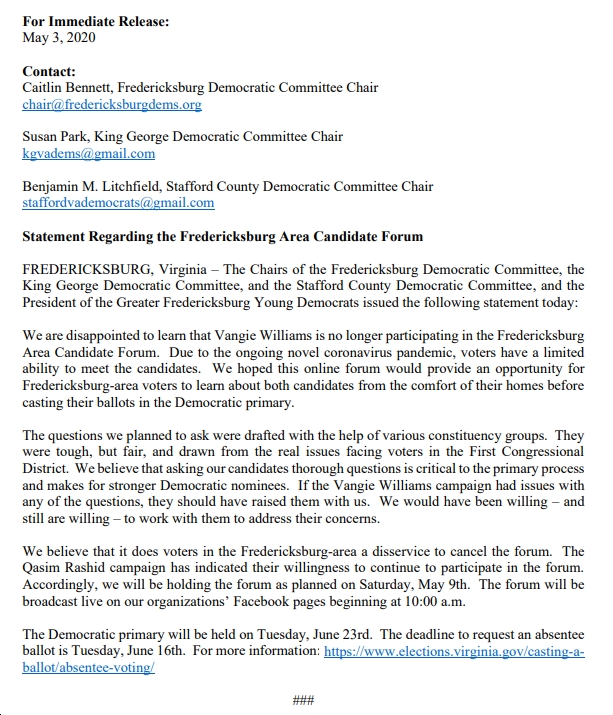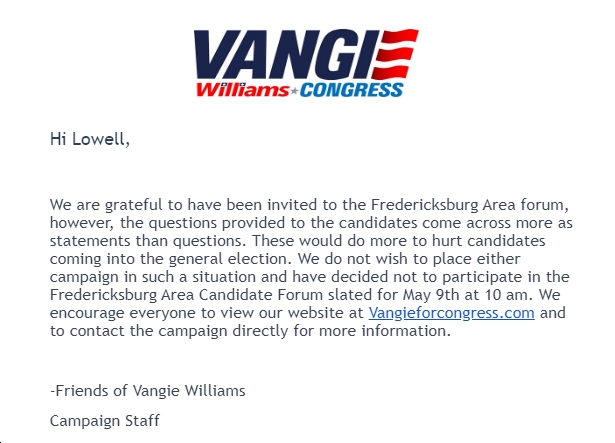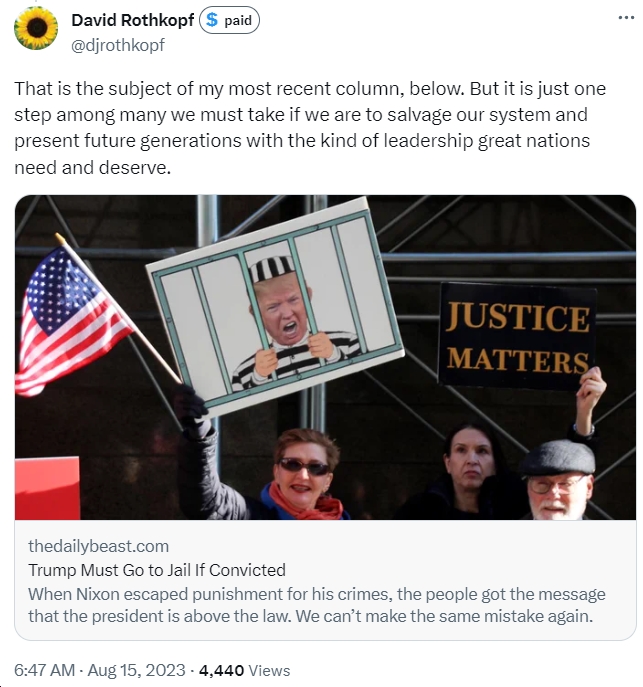See below for a statement from the Fredericksburg, King George and Stafford County Democrats regarding VA-01 Democratic candidate Vangie Williams’ refusal to participate in their upcoming campaign forum on May 9th. According to a statement from the Williams campaign earlier today (see below):
“The questions provided to the candidates come across more as statements than questions. These would do more to hurt candidates coming into the general election. We do not wish to place either campaign in such a situation and have decided not to participate in the Fredericksburg Area Candidate Forum.”
I’ve included the questions, below, so you can see for yourself if you agree that they are “more…statements than questions.” Personally, having looked through them, I’d say they’re excellent, relevant, and 100% appropriate questions; nothing wrong with them whatsoever…no idea what the Williams campaign has a problem with here; it’s completely baffling.
As for the Fredericksburg, King George and Stafford County Dems, their statement (see below) says they are “are disappointed to learn that Vangie Williams is no longer participating in the Fredericksburg Area Candidate Forum,” that “voters have a limited ability to meet the candidates,” and that “this online forum would provide an opportunity for Fredericksburg-area voters to learn about both candidates from the comfort of their homes before casting their ballots in the Democratic primary.” They further argue, correctly in my view, that the “questions we planned to ask were drafted with the help of various constituency groups…were tough, but fair, and drawn from the real issues facing voters in the First Congressional District.” Finally, they make an important point I strongly agree with: “If the Vangie Williams campaign had issues with any of the questions, they should have raised them with us. We would have been willing – and still are willing – to work with them to address their concerns.” Bingo. They conclude that, given the Qasim Rashid campaign’s “willingness to continue to participate in the forum…we will be holding the forum as planned on Saturday, May 9th.” Good…they absolutely *should* continue with the forum, whether or not one of the candidates decides not to attend!
Finally, check out Qasim Rashid’s statement, which says they made a commitment to attend the debate and stand by that commitment. The Rashid campaign adds, “We saw no issue with the proposed questions—which were provided in advance to both campaigns—and were excited for the opportunity to participate in this robust discussion.” Exactly!


***********************
Rashid for Congress Campaign Releases Statement on Fredericksburg Area Candidate Forum
We made a commitment to attend the Fredericksburg Area Democratic Primary Candidates Forum, scheduled May 9 at 10am, and we stand by our commitment. We have learned that our opponent in the 1st District Democratic Primary contest had initially accepted, but now has chosen to decline the invitation to this forum. We saw no issue with the proposed questions—which were provided in advance to both campaigns—and were excited for the opportunity to participate in this robust discussion. We believe this forum will highlight our vision for the district and help inform Fredericksburg area voters about the primary contest and the candidates on the ballot. Accordingly, we continue to stand by our commitment to participate in this forum. We look forward to discussing the issues important to voters and furthering our case for why our campaign is best equipped to defeat Rob Wittman in November. In the spirit of full transparency, we have also included the complete list of possible questions for the Fredericksburg Area Candidate Forum.
Qasim Rashid is a human rights lawyer who has dedicated his life to support women who are survivors of domestic and sexual violence and serve children from vulnerable communities. Qasim is running to transform his advocacy into results for the working families of Virginia’s 1st District. He believes in service, leadership, and compassion through action. To learn more, please visit RashidForVA.com.
FREDERICKSBURG AREA CANDIDATE FORUM QUESTIONS
- Economy
Q1. The novel coronavirus, COVID-19, presents a major crisis for the United States, both in terms of the threat to public health and the threat to economic stability. Do you support extended periods of social distancing knowing that it may result in higher unemployment numbers among lower-income Americans?
Q2. Do you support providing bailouts to large corporations, such as airlines, to make up for losses as a result of COVID-19? If so, what measures would you implement to ensure that the American taxpayer is not just writing a blank check to cover up corporate mismanagement?
Q3. Do you believe that federal financial regulators should be given additional tools to police bad actors on Wall Street? If so, which tools would you grant to regulators and why?
Q4. According to economists Anne Case and Angus Deaton, life expectancy in the United States has fallen for three years in a row – a reversal not seen since 1918 and a trend unique among advanced economies. Much of this decline is the result of so-called “deaths of despair”. Over the past two decades, deaths from suicide, overdose, or alcoholism have risen dramatically, and now claim hundreds of thousands of American lives each year – and they’re still rising. Case and Deaton report that the cause of this public health crisis is the breakdown of steady, decent-paid manufacturing jobs that once supported working-class life. What would you do to help working-class Americans who are currently struggling with the disappearance of manufacturing jobs and rising consumer costs?
Q5. U.S. Senator Elizabeth Warren and Congresswoman Alexandria Ocasio-Cortez recently introduced the Pandemic Antimonopoly Act, a bill that would impose a moratorium on mergers and acquisitions involving large companies, including private equity firms, until the Federal Trade Commission determines that businesses, workers, and consumers are no longer in severe financial distress as a result of COVID-19. Would you support such a limit on mergers and acquisitions? Why or why not?
- Infrastructure
Q1. Access to broadband internet is a major issue in the First Congressional District. In a recent article, the American Bar Association noted that “[h]aving access to affordable and reliable broadband has become one of the most critical infrastructure challenges of our time, just like electricity, transportation and roadways were in the past.” The ABA goes on to say “[e]xtending broadband to rural America is critical for many well-documented reasons, including robust economic growth, enriched educational opportunities, increased access to healthcare through telemedicine, improved public services and safety, and civic engagement. Just as important, expanding access to affordable and dependable high-speed internet is critical to improving access to justice for Americans living in rural communities.” Some of suggested that the size of this problem requires solutions on the same scale as President Roosevelt’s Rural Electrification Act, which helped bring electricity to rural communities and power family farms. What is your plan to bring broadband to all residents of the district?
Q2. Traffic is one of the biggest issues for voters in the First Congressional District. As a member of Congress, what will you do to secure funding for vital improvements to our roads?
- Food Security
Q1. During the current covid-19 pandemic, we’ve seen families struggling to feed their children across the country. In normal times, the USDA caps free and reduced lunch qualifications at 130 and 185 percent of an outdated poverty guideline. This leaves many families in need behind. Currently, schools are offering free breakfast and lunch to any child age 18 or under. After the pandemic crisis ends, how can we ensure that we don’t just return to the lesser free and reduced lunch program, and instead modify the program to ensure all children are able to eat daily?
Q2. It has become obvious that our nation’s food supply is vulnerable. Small family farms are filling the void when large national companies are experiencing production and delivery challenges. How will you support the nation’s food supply so that food is safe, affordable, and available if this happens again?
- Health Care
In answering these questions, please assume that a single payer healthcare system is not a viable legislative option.
Q1. Black Americans are systemically undertreated for pain relative to White Americans. Researchers at the University of Virginia conducted a study that suggests that this phenomenon is caused, at least in part, by the false belief among some medical professionals that there are biological differences between Black Americans and White Americans that make Black Americans less susceptible to pain than their White counterparts. As a member of Congress, what would you do to address this racial disparity in pain assessment and treatment?
Q2. The National Center for Health Statistics released data in January showing that the national maternal mortality rate – deaths caused or aggravated by pregnancy – is an estimated 17.4 maternal deaths per 100,000 live births. To put that into perspective, the Centers for Disease Control and Prevention found that about 700 women die from complications related to pregnancy and childbirth each year. For Black women, the number of deaths is almost twice the national average at an estimated at 37.1 maternal deaths per 100,000 live births. Researchers suspect this higher rate is the result of institutional racism as well as lack of access to quality prenatal care. As a member of Congress, what would you do to address this problem?
Q3. According to a recent study published in the American Journal of Public Health, over two-thirds of American bankruptcies are caused or relate to the cost of health care. This number has actually increased after the passage of the Affordable Care Act. Recently, Congress attempted and failed to address surprise medical billing, also known as balance billing, a practice where healthcare providers bill patients for treatment costs not covered by insurance. These bills can be devastating to patients. One leading solution is to set up an arbitration process in which doctors and insurance companies negotiate the cost of care before a neutral arbitrator. Another leading solution is to allow insurance companies to resolve disputes by paying doctors based on the median-in-network rate for service. This approach is known as benchmarking. Do you support either approach? If so, which do you support and why?
Q4. According to a recent study in a leading journal on endocrinology, researchers found that transgender patients suffer significant healthcare treatment disparities compared to cisgender patients. Transgender patients often require medical interventions such as hormone therapy and/or surgery to allow them to live as their true selves. The biggest barrier both to safe hormonal therapy and to appropriate general medical care for transgender patients is the lack of access to care. Transgender patients report a lack of providers with adequate expertise to address their needs and the medical profession does not offer training on transgender health as a part of the standard medical school curriculum. As a member of Congress, what would you do to ensure that transgender Americans can receive access to adequate healthcare?
Q5. The Department of Veterans Affairs is the largest integrated healthcare provider in the United States, serving over 6.2 million veterans. Veterans coping with the stresses of deployment or readjusting to civilian life are particularly at risk for drug and alcohol addiction. In fact, veterans are 1.5 times more likely to die of an opiod overdose than the general population. According to the Government Accountability Office, veterans living in urban and rural areas use the VA’s addiction treatment services at the same rate. However, treating veterans in rural areas poses specific challenges due to the shortage of specialized providers and the lack of transportation. What will you do to ensure that our veterans living in rural areas have access to these vital addiction treatment services?
Q6. Opiods are the main driver of drug overdose deaths in the United States. In 2018, the CDC reported 67,367 drug overdose deaths. Of those deaths, 46,802 – nearly 70 percent – were related to opiods. In February, Virginia Attorney General Mark Herring reached a global settlement with Mallinckrodt, the largest generic opiod manufacturer in the United States, that resulted in a $1.6 billion payment to cover the cost of opiod addiction treatment and stringent requirements governing the future sale of generic opiods. Herring has also sued Purdue Pharmaceuticals, the Sackler Family, as well as fentanyl manufacturers Teva Pharmaceuticals and Cephalon. As Herring put it, our families in Virginia are being torn apart by this epidemic. What will you do in Congress to end the opiod epidemic and hold those responsible accountable?
Q7. Earlier this year, prescription drug manufacturers increased the list prices on over 457 brand name drugs by an average 5.1 percent. These increases far outpace the rate of inflation which currently sits at about 1.5 percent. The news is filled with reports of astronomical drug prices from the $700 cost of an EpiPen to the exploits of securities fraudster Martin Shkreli who increased the price of daraprim, an antiparasitic drug, from $13.50 to $750 per pill. Congress has attempted to address the cost of prescription medications over many years. For example, the Hatch-Waxman Act reformed the patent system and made it easier for generic drugs to come to market more quickly. However, pharmaceutical companies began to enter into a series of anticompetitive reverse payment agreements with generic manufacturers to delay those drugs. More recently, Speaker Pelosi backed a bill that would allow the Department of Health and Human Services to negotiate for the best price for over 250 medications. In Virginia, Delegates Lee Carter and Joshua Cole championed a bill to cap the price of insulin. Unlike so many other efforts at the federal level, that effort was successful. Do you support these kinds of price caps? If so, how will you ensure swift action at the federal level to cap rising drug costs?
Q8. Do you support providing additional resources to rural hospitals to combat COVID-19? If so, what resources do you believe are most important to provide to those rural hospitals immediately? Would you commit to championing rural healthcare as the next Congressperson from the First Congressional District?
Q9. According to the Human Rights Campaign Foundation, 17% of LGBTQ people lack health coverage. Many who do have coverage face discrimination such as providers refusing care and insurers refusing to cover PrEP which is a vital part of preventing HIV. How would you protect LGBTQ+ health care and expand access?
- Labor Rights
Q1. In the 2020 legislative session here in Virginia, there were many wins for the labor movement, but one significant loss was in the failure to repeal the so-called Right to Work laws that make it difficult for unions and working people to organize within the Commonwealth. However, there is current legislation in Congress, the Protecting the Right to Organize Act of 2019 (or PRO Act) introduced by Rep. Bobby Scott of Virginia, would effectively repeal those same Right to Work laws nationwide. Would you support this kind of legislation in Congress and what would you do to ensure that it passes through the Senate?
Q2. Large percentages of money that come from bailouts that we have seen given to corporations and businesses are used for Stock Buybacks instead of wages for their employees. This was most recently seen in the Airline Industry Bailouts where those companies used 98% of the money given to inflate the cost of their shares through these buybacks during a time of a great pandemic. What would you do to ensure more oversight into how this money is used in the future, a larger worker presence in the planning of the use of the money, and what steps would you take to install more workers’ protections during a time of crisis like this?
Q3. One issue that has been spotlighted in the US during the COVID-19 Pandemic is the need for paid medical and family leave for all workers in the country. While many Democrats have called on the expansion of paid medical leave to at least 12 weeks, businesses and the chamber of commerce have stated this puts undue strain on them, primarily small businesses who have employees of 50 or less. Do you agree that this is unfair to put on these businesses or do you believe that we should have mandated family medical leave for all?
Q4. In the 2020 Reconvened Session of the Virginia General Assembly, the state legislature voted to pass the Governor’s amendments to bill that passed earlier this year which allowed the state to start increasing the minimum wage, which delay the timeline from starting on January 2021 to May 2021 after the Governor threatened to veto the bill entirely if amendments weren’t passed. However, many have still criticized the increase to $15/hour minimum wage increase on 2 different sides. One side says that the increase will drown small businesses, while the other side says we need to raise it higher than $15/hour because of the growth of the economy and overall inflation since 2012 (when the number was originally proposed by union advocates). Do you agree or disagree that we should increase the federal minimum wage to at least $15/hour and what is your reasoning?
- LGBTQ+ Issues
Q1. Do you support a federal ban on the “gay panic” defense?
Q2. How would you address the alarming rate of violence against the transgender community, particularly transgender women of color?
Q3. Recently, Gov. Ralph Northam signed a bill into law that would expand non-discrimination protections on public employment, housing and credit on the basis of sexual orientation and gender identity. Do you support similar federal protections?
Q4. Do you support the addition of a third gender option on all identifying documents such as driver’s licenses and birth certificates?
Q5. LGBTQ+ youth face serious problems with bullying and harassment in America’s schools. We have seen great strides here in the Commonwealth towards providing a safer environment for LGBTQ+ students. As a member of Congress, how would you work to combat bullying and discrimination in schools?
- Criminal Justice Reform
Q1. This past legislative session, the General Assembly decriminalized the possession of up to an ounce of marijuana. Anyone caught carrying up to one ounce of marijuana will receive a fine up to $25 with no threat of jail time an no criminal record. Many are viewing this as a necessary step towards broader reform. However, some critics believe that decriminalization falls far short. In fact, the ACLU of Virginia has said that this incremental approach is worse than the status quo given the potential for discriminatory policing against black and brown communities. Where do you stand on marijuana legalization?
Q2. Do you support the elimination of mandatory minimum sentences for federal crimes?
Q3. Do you support the reauthorization of the Violence Against Women Act?
Q4. What more can the federal government do to encourage community-oriented policing?
Q5. Do you support strict limits on civil asset forfeiture? Why or why not?
Q6. Do you support the War on Drugs? Why or why not?
Q7. From a federal policy perspective, what is the key takeaway from the tragedies in Ferguson, Missouri?
Q8. The United States has one of the largest prison populations per capita compared to similarly situated nations. Do you believe that this is a problem? If so, how would you solve that problem?
Q9. There are two providers of prison phone call services, Securus and Global Tel-Link. These companies are routinely criticized for charging exorbitant costs to prisoners to make phone calls, including video calls, to their families. The Federal Communication Commission attempted to regulate this market but a decision by the D.C. Circuit calls the FCC’s regulations into question. Do you support a legislative fix to ensure that prisoners can make affordable calls to their families? Why or why not?
Q10. Related to the previous question, a large driver of these costs appears to be kickbacks to state and local governments to encourage those governments to enter into agreements with Securus and Global Tel-Link for prison telephony services. Do you support a legislative fix to make these kinds of kickbacks illegal? Why or why not?
- Environment
Q1. The U.S. Department of Commerce recently found the Commonwealth of Virginia out of compliance with various federal requirements limiting the amount of menhaden, a protein rich fish, that can be harvested each year from the Chesapeake Bay. This finding is the result of Omega Protein catching approximately 30 percent more menhaden than allowed under existing federal harvesting caps. If Virginia does not come into compliance by June 17, 2020, the U.S Department of Commerce has threatened to impose a moratorium on menhaden harvesting in Virginia which could have severe economic consequences for local fishermen. Do you support the Commerce Department’s decision? If so, what more can be done to hold companies that violate conservation laws accountable?
Q2. Fones Cliffs is a stretch of the Rappahannock River of immense environmental and historical significance. The area serves as a key spot for bald eagle nesting and a major nursery for area fish including the striped bass, shad, and sturgeon. The area was also the site of an important battle with the Rappahannock tribe first noted by Captain John Smith. However, the site is also the location of a controversial proposed development. The developer, Virginia True, LLC, is being sued by Attorney General Mark Herring for numerous violations of state environmental protection laws. On the federal level, what more can we do to protect our critical waterways?
Q3. Do you support greater federal investment in alternative energies like solar, wind, and hydroelectric power? If so, what would you do to help families dislocated due to the transition from fossil fuels to renewable energy?
Q4. Recently, the General Assembly passed the Virginia Clean Energy Act, a sweeping reform of the Commonwealth’s energy laws. However, critics have argued that the law does not go far enough to address the growing threat of climate change. Do you agree with these critics? If so, what more can be done at the federal level to address climate change and how do we encourage states to adopt aggressive climate change policies?
Q5. Do you support the Green New Deal? If not, are there elements within the Green New Deal that you do support?











